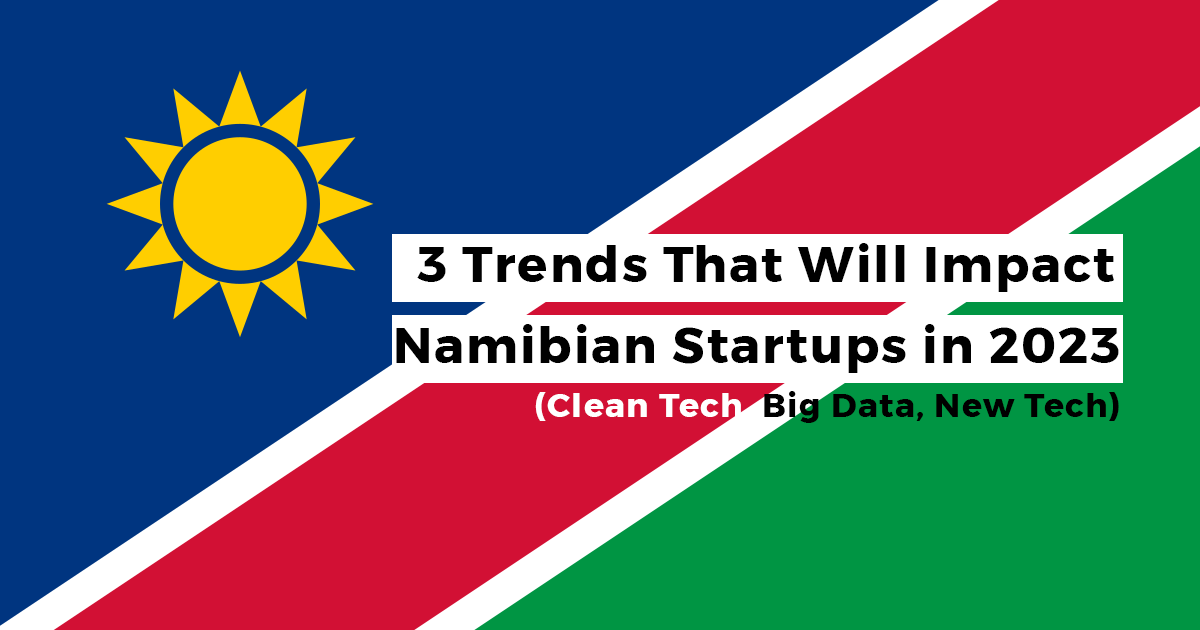3 Trends that will Impact Namibian Startups in 2023

Start-ups can boost economic growth by encouraging innovation and a competitive business ecosystem. They can also drive job creation and improve productivity. The project enables entrepreneurs to bring new ideas that can stir innovation and stimulate competition. Namibia had a thriving ecosystem in 2022; buoyed by the landing of the Equiano cable and growing demand for digital services.
Businesses have been realizing the urgency of creating solutions around cloud computing uptake, blockchain development, and artificial intelligence while upskilling their staff on these technologies.
Startups cluster and thrive in ecosystems with the necessary resources for success. These include effective tertiary institutions, incubators, public- and private-sector support, and access to expert services like legal, accounting, and consulting/data services. Namibia’s startup ecosystem has been inadequate, having lacked several resources. However, with certain pull factors falling into place, the country’s startup ecosystem now possesses new growth potential.
Innovators will look to leverage the increased level of demand for digital services while also considering the pull factors of this demand. The out highlights the major trends that will shape Namibia’s startup ecosystem this year.
Cleantech
Filippo Berardi, Senior Climate Change Specialist from the Global Environment Facility (GEF), speaking at the second phase of UNIDO’s Global Cleantech Innovation Program said that the economic and production structures that have characterized Africa’s development thus far must be changed within the next ten years. According to him, innovation through clean tech is essential to achieving this.
Namibia sees green hydrogen as essential for reviving and expanding its economy. Speaking on green energy, the president of Namibia, Hage Geingob, remarked that cleantech has become a significant topic necessary for the development of the country. Namibia, which has already started the process by choosing a preferential bidder, is ahead of South Africa in converting green hydrogen into a practical source of economic growth.
However, Namibia, in contrast to South Africa, is mostly concerned with exporting green hydrogen to countries in Europe. This is due to projected collaborations for economic growth through local green hydrogen generation and foreign exportation, as well as a relative lack of local cleantech startups in the country. This has resulted in a lower domestic demand or potential for green energy in the country.
Given Namibia’s designation of cleantech, there is numerous potential for investors and cleantech entrepreneurs. From the growth of ancillary and support infrastructure to the expansion of digitalization and the production of renewable energy, cleantech holds massive potential in Namibia.
Big Data
Big Data offers data collection, archiving, analysis, and interpretation by itself. In essence, it is used to advance business. Businesses exist because of their clients, and the better they comprehend their needs, the better they can meet those needs. Every day, your customers leave “digital fingerprints” of their needs, and data firms assist businesses in making effective use of data, highlighting their importance.
Big Data companies are in huge demand in Namibia given that more and more organizations are seeking competitive advantage. This was evident last year as the first carrier-neutral data center was launched in Windhoek, Namibia. The service meant that clients hosting at the facility will be able to select the telecoms provider from which they want to buy services. The facility is Namibia’s largest DC facility thanks to a $123 million investment from Paratus Namibia.
Namibia is one of Africa’s smallest but richest nations, with over 2 million people living there. Despite having one of the lowest GDP per capita in sub-Saharan Africa ($737 annually), substantially lower than its neighbors Botswana ($1281) and South Africa ($1179), the nation has made great progress in recent years toward a more diversified economy. The demand for greater infrastructure will increase due to rising personal income levels, household expansion, and population shifts from rural to urban areas related to big data provision in the country.
New Tech
Africa is certainly developing its technology, embracing the Internet as well as 4G and 5G. The beauty of technology is that innovation, its application, and its leveraging of it can happen anywhere in the world. Although a certain spectrum of innovation appears nascent and expensive, Africa is obviously not backing out from adopting them.
The Fourth Industrial Revolution, the Metaverse or Artificial Intelligence are all rising quickly in Africa and while certain fundamentals are not in place yet in Namibia, they will inform necessary investment parts for the advancement and adoption of new technology in Namibia.
